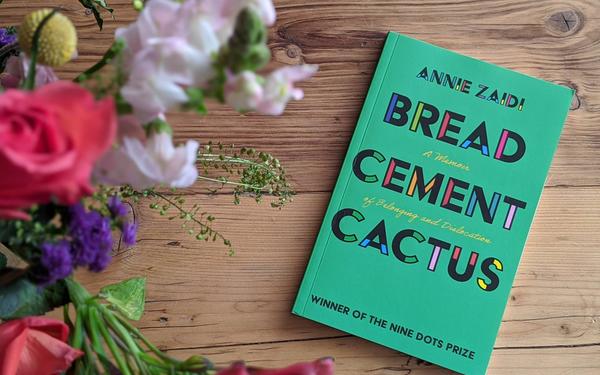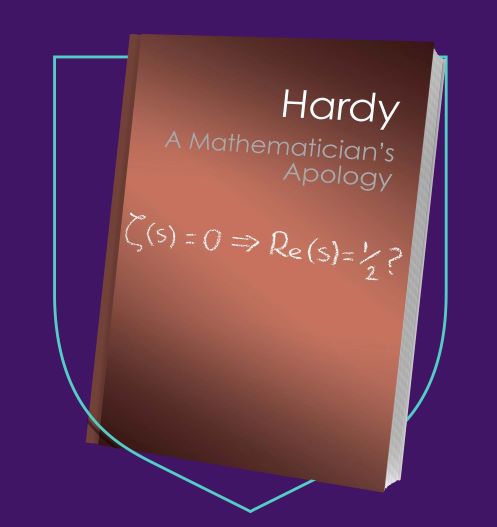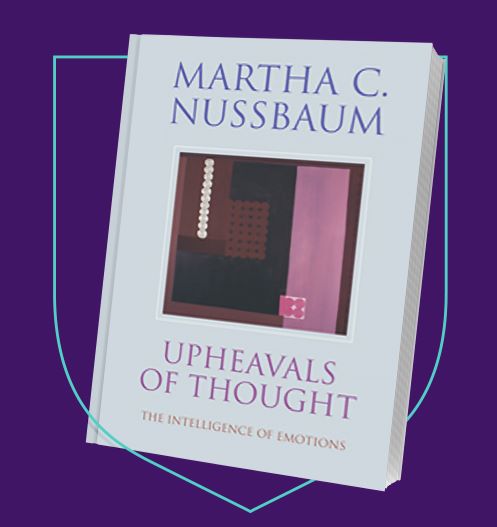The books we love and why – Read a Book Day 2021
This Read a Book Day, we are sharing the books that made us laugh, cry, or changed our lives, and we are celebrating them by recommending them to others.
Our own rich history in publishing makes us proud to be part of this celebration of books of all genres and types. As the oldest publishing house in the world, our first ever book was published in 1584. Each year we publish over 1,600 books and more than 380 journals in 29 subject areas, bringing millions of ideas on thousands of subjects to the world.
We spoke to colleagues from across our organisation and all over the globe about their favourite books and why they recommend them to others.


A Mathematician's Apology by G.H. Hardy
Peter Phillips, Chief Executive, Cambridge
The book I'd recommend is "A Mathematician's Apology" by G.H. Hardy. It's a book Hardy wrote in his 60s as he was coming to the end of his career as a top mathematician, and it explains the beauty he found in mathematics and why he thought it was worth studying for its own sake rather than just for its applications to practical problems. The book also tells his life story, including his friendship with Ramanujan, an extraordinary mathematician working as a clerk in Madras. He was invited by Hardy make the long voyage to Cambridge where he spent five years before returning to India where he died soon afterwards aged only 32. There's a film of the story with Dev Patel and Jeremy Irons called The Man who Knew Infinity. Hardy's book changed my life; it helped me understand the magic of mathematics and was central to why I studied it at university. It's also an entertaining read full of good stories and doesn't require any knowledge of mathematics to enjoy it either. There's another personal link too as Hardy approached Cambridge University Press with his manuscript in 1940, assuming (wrongly) he'd have to pay to publish it. The Press printed 4,000 copies in its first run and it's still in print with Cambridge eighty years on.
The Handmaid's Tale by Margaret Atwood
Victoria Goodbody, Administrator, OCR, Cambridge
My favourite book is The Handmaid's Tale by Margaret Atwood, which I first read at 15, soon after it came out. At the time I thought it was an interesting but unlikely science fiction novel, however recent events have followed the plot. I don't re-read books very often, however this is one of them, and it is one that I always recommend to people over the age of 11.
Cloud Atlas by David Mitchell
Rosie Applin, Communications & Marketing Manager, Cambridge Assessment Network, Cambridge
My favourite book is probably Cloud Atlas by David Mitchell. It’s a massively ambitious novel and I think that’s why I enjoyed it so much. It’s epic in scale and length, covering different periods in history from the past to the future. The central idea is that souls cross time like clouds crossing the sky. I think it’s about the universality of the human spirit and what’s common between all of us. There is also an interesting running thread about power and those who seek to oppress groups and individuals. Its philosophical but also a really fun read as it covers lots of different genres as you meet different characters, so it feels like reading several mini novels that all link together. The film wasn’t very well received but don’t let that put you off!
Conversations with Friends by Sally Rooney
Astrid Zong, Assessment Administrator, Cambridge Assessment English, Cambridge
My favourite book is Conversations with Friends by Sally Rooney. I have a thing for first-person narratives, and this book does it incredibly well. First-person narratives can ramble on. They can be self-indulgent and gratuitous. They can try too hard to be funny, literary, insightful, or personable. The narrator of Conversations with Friends does none of those things. The story is a page-turner; you'll want to find out what happens next so much you end up finishing it in one day. The set-up is kind of like a cross between Bonjour Tristesse and A Certain Smile, both by Françoise Sagan, and you should read it if you liked those, or if you like first-person narratives about love triangles (there are many) in dreamy locations (there are many)!
Tiny Habits, the Small Changes that Change Everything by BJ Fogg
Arun Rajamani, Managing Director South Asia, New Delhi
We all aspire to become better people every single day by changing our behaviours. Change happens when we do things differently and sustainably, but behavioural changes happen only when there is motivation, ability and a trigger or prompt to effect this change. With the right motivation, some behavioural changes are easier to accomplish when the ability to change is easy. When we accomplish a small behavioural change, we feel a sense of accomplishment, and that pushes us to try for more. Harder and profound behavioural changes are more difficult to sustain as our motivation levels dip. If we can break behaviours that are hard to change into “tiny” behavioural changes and accomplish them, they will eventually become a habit and will become easier to sustain. Habits, once formed, become mechanical and part of our muscle memory and will not need continued motivation, like brushing our teeth every day. This book is helping me understand ways to form “tiny habits”. These habits maybe tiny, but the results are big! Small habits such as reflecting on my day for 15 minutes every evening, helps me stay focused. This is certainly a great read and highly recommended!
Lincoln in the Bardo by George Saunders
Sarah A Taylor, Operations Support Task Team Leader, Cambridge Assessment International Education, Cambridge
It’s so hard to choose a favourite book, because tastes change, and timing can make a huge difference. For me, it’s easier to pick my favourite author: George Saunders. Saunders is a current master of the short story, and there’s a fantastic contrast between human sympathy and wry humour in all his work, from his absurdist satirical fiction to his astute political essays. I think my favourite book, one that reminds me why I enjoy reading, would have to be Saunders’ first novel, Lincoln in the Bardo. The Bardo is an afterlife realm and the newest arrival is a young boy called Willie, who happens to be the son of Abraham Lincoln. The Bardo’s characters all appear as supernatural versions of themselves in the moment of their death, but this bizarre concept is grounded by sincere and realistic characterisation which works wonderfully. The thing I find most interesting about the book is its structure. The story is presented through direct speech (almost more like a play than a traditional prose narrative) with some chapters set in the Bardo and told by the characters there, and others creating a portrait of President Lincoln in the build-up and aftermath of Willie’s death through historical quotations. These chapters mix differing opinions to show how perception and memory can vary, although, about half of the sources were completely fabricated by Saunders himself! I’d recommend this book to anyone who likes literary fiction, surrealism, or satire. It features some sensitive topics (content warnings for suicide, rape, and racism) and is quite experimental, so it won’t be for everyone but it’s definitely worth giving a go.
Temporary by Hilary Leichter
Heather Otrando, Academic Product Support Manager, Production, New York
Choosing an all-time favorite book feels impossible. There are so many books I love, and which one I would say is my favorite probably depends on my mood on any given day. But a book I read recently and loved is Temporary by Hilary Leichter, which is set in a world that is not quite ours, though there are some similarities. The narrator of the novel is a temp worker, and always has been, but in the world of this book, being a temp can include things like filling in for the Statue of Liberty, or for a barnacle, or for a ghost. I'd recommend this to people who like weird/surreal literary fiction with humor and heart. This book is about capitalism, the gig economy, loneliness and identity and how people interact and relate to each other. It is straight-up bonkers, in a way I found really satisfying.
Grinding My Ink by Margaret Chula
Kimberley Silver, Commissioning Editor, Product Management, Mexico City
Choosing a favorite book is tough. I think it depends on the moment in one's life and what resonates at that particular intersection of time and space. A book that still resonates strongly with me after nearly 30 years is a collection of haiku in English: Grinding My Ink by Margaret Chula. Chula's haiku capture ephemeral flakes of experience while living in a decrepit wooden house on the outskirts of Kyoto for over a decade, a home which was torn down after she moved away. I lived in rural Shikoku in the early 1990s and her haiku still take me back to the sights, smells and sounds of that extraordinary place:
sound of a moth / trapped in a paper lantern / summer rain
pomegranates / burst open on the ground / sputtering sparrows
Goodnight Mr Tom by Michelle Magorian
Lucy Carey, Subject Advisor, OCR, Cambridge
Like many others, choosing one book is extremely difficult. It depends on where you are emotionally and perhaps physically too. A book can stir you in different ways depending on "where you are". Perhaps one of my favourites is Goodnight Mr Tom by Michelle Magorian, which was first read to me by a teacher when I was 11. It teaches you about World War Two, evacuees and love and loss. This book has travelled with me when I taught abroad. I have used it in classes to teach English, but I also used to read it when I felt homesick whilst living in West Africa and Japan. It then took on a new meaning when I was able to read it to my own children six years ago. As I type, it is on my bookshelf now, and like a smile from a great friend, it gives me comfort.
Inferior by Angela Saini
John Skeffington, Senior Analyst, Cambridge International, Cambridge
I’d recommend Inferior by Angela Saini. Shedding light on controversial research and investigating the ferocious gender wars in biology, psychology and anthropology, Angela Saini takes readers on an eye-opening journey to uncover how women are being rediscovered. She explores what these revelations mean for us as individuals and as a society, revealing an alternative view of science in which women are included, rather than excluded.
Pachinko by Min Jin Lee
Catherine Rayson, Marketing Executive, Marketing, Cambridge
I'm a pretty ferocious reader so picking one book is too difficult (although To Kill a Mockingbird is still up there)! A standout book for me in the past couple of years though is Pachinko by Min Jin Lee which follows four generations of a Korean family and their move to Japan. It's excellent and so incredibly moving. I'd recommend it to anyone, but especially those who like to learn more about other cultures and history through fiction.
The Golden Notebook by Doris Lessing
Brigitte Shull, Senior Vice President of Academic, New York
This book made such an impression on me when I read it originally in my 20s. The characters are all grappling with their own consciousness and it prompted me to do the same to some degree. I’d recommend the book because while there is a lot to learn about that particular moment of feminism, many of the critiques are surprisingly fresh and relevant today. The dialogue is smart and sharp and makes for good reading too.

Upheavals of Thought – The Intelligence of Emotions by Martha C. Nussbaum
Alastair Lynn, Business Lead, Cambridge University Press Bookshop, Cambridge
This book took up a significant part of my studies many years ago and yet I still find myself thinking about it today. Martha Nussbaum is the most extraordinary thinker, not only intimidatingly accomplished but also a gifted writer and communicator. In this book, she argues for the consideration of the role of emotion in how we encounter and navigate our way through the world and for a more pivotal role for it in any ethical theory. Using art and literature to illustrate her points she demonstrates how emotions can engender a more finely tuned understanding of the world than reason alone. In these days of increased political polarisation, I think we’d all do well to remember the importance of a little empathy in our dealings with others.
The Girl with the Louding Voice by Abi Dare
Vicky Evans, Head of Sustainability, Cambridge
Set in Nigeria in 2014, the year Boko Haram kidnapped 276 schoolgirls, ‘The Girl with the Louding Voice’ follows the story of Adunni, a 14-year-old girl from a small village outside Lagos. As she is sold into marriage, she takes us on her gruelling and untimely journey from girl to woman. Despite the obstacles in her path, with strength and humour, she keeps sight of her goal of escaping the life of poverty she was born into and finishing her education so that she can build the future she chooses for herself, and help other girls like her do the same. I found this an unforgettable and often uncomfortable book. It tells some extremely hard truths about the world we have created. Adunni’s story represents the reality as well as the hopes and dreams of millions of girls whose lives are dominated by a lack of education, poverty, and modern slavery (In 2020 UNICEF estimated that over 160 million children under the age of 14, were still subjected to child labour and/or slavery). But despite the difficult truths, it is ultimately a book for anyone who believes in the power of education to make change happen. Giving girls like Adunni a voice is the reason that we work to make education and opportunity available to all. And Adunni’s message is one that every young person should hear and shout to the rooftops: “I have value and I’m important.”
The Hitchhikers Guide to the Galaxy by Douglas Adams
Isobel Morris, Application Support Technician, Cambridge Assessment English, Cambridge
The Hitchhiker's Guide to the Galaxy ("trilogy of four, of which there are five"!) by Douglas Adams is my very-long-standing favourite. It must be a solid 20 years that this has held the top spot for me! Douglas Adams' particular humour, and how he mixes it into characters and plot, and how he formats his stories with asides and tangents, all work so well. Rarely a day goes past when I don't think of something from this series - like the Somebody Else's Problem field (which makes things invisible, by projecting a sense that it's not something you need to be concerned with), or the very-well-observed fact that anyone capable of getting himself made president should on no account be allowed to do the job!

Bread Cement Cactus by Annie Zaidi
Victoria Willingale, Senior Marketing Executive, Academic, Cambridge
I loved reading Bread Cement Cactus. Annie Zaidi’s memoir based on the question ‘Is there still no place like home?’ made me reconsider my perception of home and the impact it has had on my identity. Annie’s writing is engaging, vivid and deeply informed. I thoroughly recommend Bread Cement Cactus to anyone looking to expand their world view or reframe their experiences based on the socio-political environment of their upbringing.
The Power by Naomi Alderman
Jane Mann, Managing Director, Cambridge Partnership for Education, Cambridge
One of the books I’ve read that has really stayed with me is The Power by Naomi Alderman. It’s a speculative-fiction book, with a feminist twist that flips power dynamics on their head; one of those books that makes you start joining the dots and thinking about how different the world might be if the accepted norms were utterly rewritten. It’s a real page-turner too, with a highly addictive plot. Essentially (no spoilers!), it’s a story-within-a-story, based on the premise that one day, girls wake up and discover that they can generate electricity from their hands at will. Across the world, as this new power is discovered, it changes almost literally everything. I’d recommend this book to anyone wanting to lose themselves in a great story, but who is also prepared to have some of their assumptions tested, in sometimes uncomfortable ways. I have to be honest and say that some of my male friends probably found it a more uncomfortable read than I did, but I think the questions it provokes are important, and it’s utterly gripping. Alderman is a genuinely clever storyteller.
What’s your favourite book? Let us know by tweeting us at @CambPressAssess to join the conversation.
